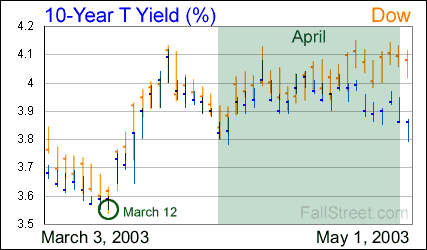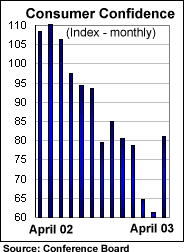May 2, 2003
Golden Quotes
http://www.csulb.edu/~pammerma/fin450/EMH%20Lecture2.ppt
The above link - to a Power Point presentation from California State University entitled ‘Are the Markets Rational? – should be required reading for any new investor. To be sure, insights from Graham, Buffett, and Fisher are significantly more valuable than those from Wall Street and CNBC. Moreover, these insights will continue stand the test of time. Consider what Keynes said nearly 70-years ago:
“They are concerned (market professionals), not with what an investment is really worth to a man who buys it ‘for keeps’, but with what the market will value it at, under the influence of mass psychology, three months or a year hence.”
With the above quote in mind, according to Bloomberg Merrill’s Richard Bernstein was the only money manager that didn’t recommend clients own more stocks than bonds last month. Commenting on Bernstein’s apparent one month miscalculation, analyst Richard Campagna says:
“It didn't work. The problem with a lot of these guys is that they have a story and stick with it regardless of what the market does.”
The problem with an investor is that he sticks with his investment criteria regardless of what the market does? Is Mr. Campagna watching ‘Mr. Market’ and not thinking for himself?
Regardless, yes Treasury’s have slumped since mid-March while stocks have performed well. However, rather than accuse Mr. Bernstein of being ‘wrong’, it is important to recognize that his outlook calls for the S&P 500 to lose ground in the coming twelve months (which suggests bonds will outperform). Moreover, and using the quote “humans are influenced by how information is presented” – it is important for the Campagna’s, and Bloomberg for that matter, to present all the facts. After all, while the Bloomberg article in question presents Bernstein’s failings, what it does not report is that Bernstein raised his bond weightings in mid-April 14 (well after what the article leads us to believe): Bernstein reduced cash to 10% from 20%, and raised his bonds weighting from 45% to 35% on Monday April 14 (kept stocks at 45%), and since April 14 bonds have rallied (yields have dropped) – albeit at a slightly slower pace than most major equity indices.
 |
In short, Berstein may be right or wrong in the coming months, but at least he is not changing his investment opinion to try and coincide with the next trend in the markets. Chances are, the investor that bought into the war rally is also salivating over the possibility of a turnaround in capital spending, and pricing in/buying stocks for the supposed late 2003 earnings explosion. Again, a Keynes quote will suffice:
“We have reached the third degree where we devote our intelligence to anticipating what average opinion expects the average opinion to be.”
 No Confidence in Confidence Reports
No Confidence in Confidence Reports“If this confidence number is to be taken at face value, then why is it that auto sales so far appear to be below plan in April (despite record incentives) and why are chain store sales coming in below-target for the month as well.” TheStreet
Although Monday’s reported rebound in consumer confidence was stronger than expected, it was nonetheless not surprising given the events taking place in Iraq. However, what would be surprising is if consumer confidence – more importantly consumer spending – can continue to post gains in the face of a weak labor market. Put simply, oil is down, stocks are up, and people are feeling a little bit better about the world than they did a month ago. Yet the impetus for companies to spend and hire is nowhere to be found (yesterday’s weaker than expected ISM report further hardening the reality of over capacity).
Suffice it to say, without spending and hiring the rebound in confidence will not be sustained. Moreover, without an ongoing mortgage refinancing mania consumer spending will be negatively impacted (again, watch those interest rates). Will Bush’s tax cuts and consumer savings from falling energy prices make up for the expected and inevitable reduction in mortgage refinancings? Well, I am not confident that the conference board’s survey of 5,000 people is an accurate indicator of the U.S. economy’s health, but I am even less confident that once interest rates head higher that the damage inflicted on the housing market will be glossed over by another area of strength.
Wall Street Plays The Game
In the late 1990s a baboon could have launched a successful IPO, but only a Mary Meeker could double or triple the IPO price (more money for the Street). At the height of the mania any tech guru’s words could move a tech stock, but only bulgy eyed Blodget and a handful of others could move internet stocks by 10-20% while doing an entertaining skit on CNBC (more money for the pre-positioned Street).
Regardless, before blaming the Street for breaking down imaginary Chinese walls, one should understand why the Street was (and some would argue still is) more interested in churning out car salesmen than analysts: crazy investors. To be sure, for much of the 1990s money was flying into equities, without relent, as people that never invested before concluded after little or no research that being the markets was a way to get rich.
Why would Wall Street go to the effort of employing real equity analysts – analysts that would likely make realistic rather than insane market calls (being insane was contagious while being rational (Biggs) meant you were ignored) - when all the investing public wanted to hear was the words ‘buy’ and ‘profit’?
This is not to suggest that Wall Street didn’t break any laws. They did – and on an appalling scale. However, the individual investor deserves much of the blame for the run-up in prices and the inevitable crash. As for those duped by Wall Street’s investment banking backed lies being reimbursed…if this was possible I would be all for it – it isn’t.
What Needs to be done
$1.4 billion, a non admission of guilt from Wall Street, and what will undoubtedly be more imaginary Chinese walls doesn’t solve anything. To be sure, what is required to ensure that 1990s doesn’t happen again is not a feeble attempt to restore ‘investor confidence’ from Wall Street and the SEC, but a real attempt by investors to acquire ‘knowledge’.
To note: every time the SEC and Wall Street talk about restoring investor confidence in the markets, what they are really trying to do is restore investor ignorance. Think about it: is it intelligence or ignorance that makes investors buy mutual funds (most do not beat the S&P and they all carry fees), and stay in the markets? If you back out the 1990s completely – and ignore the Street’s forward earnings estimates and flawed Fed models - today’s market is still one of the most expensive in history.
Before & After Iraq
In December 2002 the cash U.S. dollar index was hovering around 105, the current crude oil contract (for June 03) was pushing $26 a barrel, and spot gold was beginning to jump solidly above $320 an ounce. As the new-year began these three already volatile commodities (yes, a dollar bill is a commodity like any other) would continue to factor in the upcoming war: spot gold pushed $390, June crude rallied to $34.90 (March 10), and the dollar index slumped to 98.36 (March 10).
As war fears diminished, a sense of normalcy returned to the markets in question: gold touched $320 an ounce, crude made its way back to $26, and the dollar index made it above 102. However, in recent weeks – crude still in a slump – the U.S. dollar has begun to slide and gold has slowly rallied.
Remembering the trend in interest rates – yields have risen since March 12 but are now dropping again - gold does not seem to be pricing in inflation or deflation, but simply feeding off of a weakening dollar. Accordingly, the argument could certainly be made that the current rally in gold, unlike the exciting war rally that began in December, is sustainable.
A final quote
The stock markets are in rally mode and the U.S. dollar is weak (an oddity for sure). The bears are being squeezed out of the equation as the story of a ‘second half turnaround’ is told. Is the influence of mass psychology at work?
“Ben Graham told a story 40 years ago that illustrates why investment professionals behave as they do: An oil prospector, moving to his heavenly reward, was met by St. Peter with bad news. “You’re qualified for residence”, said St. Peter, “but, as you can see, the compound reserved for oil men is packed. There’s no way to squeeze you in.” After thinking a moment, the prospector asked if he might say just four words to the present occupants. That seemed harmless to St. Peter, so the prospector cupped his hands and yelled, “Oil discovered in hell.” Immediately the gate to the compound opened and all of the oil men marched out to head for the nether regions. Impressed, St. Peter invited the prospector to move in and make himself comfortable. The prospector paused. “No,” he said, “I think I’ll go along with the rest of the boys. There might be some truth to that rumor after all.”
Warren Buffett. 1985 Annual Report
http://www.berkshirehathaway.com/letters/1985.html
All data and information within these pages is thought to be taken from reliable sources but there is no guarantee as such. All opinions expressed on this site are opinions and should not be regarded as investment advice.
Copyright © 2000-2003. FallStreet.com